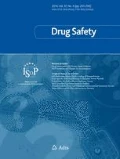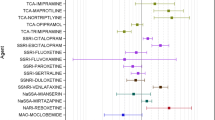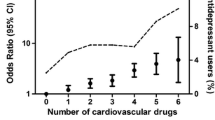Abstract
Background: It has been suggested that increased platelet activation increases the risk of acute myocardial infarction (AMI) in patients with depression. Selective serotonin reuptake inhibitors (SSRIs) may attenuate platelet activation by serotonin depletion in platelets. Observational studies have shown discrepant results of AMI risk associated with the use of SSRIs.
Objective: The aim of this study was to evaluate the association of exposure to different groups of antidepressants, including SSRIs, and the risk of AMI. The study also assessed in more detail the influence of timing of the exposure to antidepressants in a general adult population (<90 years of age), with or without diagnosed risk factors for AMI.
Study design/methods: We conducted a population-based case-control analysis on the UK General Practice Research Database (GPRD). The study included 8688 patients (<90 years of age), with a first-time AMI between 1995 and 2001, and 33 923 controls, who were matched by age, sex, calendar time, and general practice. Conditional logistic regression was used to estimate odds ratios (ORs).
Results: Current use of an antidepressant was defined as a supply of the last prescription for an antidepressant that lasted up to the index date or beyond. Recent past use was defined as a supply of the last prescription for an antidepressant that ended 1–29 days before the index date. SSRIs investigated were citalopram, fluoxetine, fluvoxamine, paroxetine, sertraline and venlafaxine. Non-SSRIs investigated were amitriptyline, clomipramine, dosulepin, doxepin, imipramine, lofepramine, nefazodone, trazodone and trimipramine. Other antidepressants included were amoxapine, desipramine, lithium, maprotiline, mianserin, moclobemide, nortriptyline and protriptyline. Adjusted ORs (with 95% CI) for the current use of SSRIs, non-SSRIs, or other antidepressants, compared with non-use of antidepressants, were 0.63 (95% CI 0.43, 0.91; p = 0.02), 0.92 (95% CI 0.77, 1.09; p = 0.32) and 0.59 (95% CI 0.29, 1.20; p = 0.14), respectively. The adjusted OR of recent past use of SSRIs compared with non-use of SSRIs was 1.42 (95% CI 1.02, 1.97; p = 0.04).
Conclusion: The present analysis provides further evidence that the current use of SSRIs is associated with a slightly decreased risk for AMI.



Similar content being viewed by others
References
Penninx BW, Beekman AT, Honig A, et al. Depression and cardiac mortality: results from a community-based longitudinal study. Arch Gen Psychiatry 2001; 58(3): 221–7
Ford DE, Mead LA, Chang PP, et al. Depression is a risk factor for coronary artery disease in men. Arch Intern Med 1998; 158(13): 1422–6
Barefoot JC, Schroll M. Symptoms of depression, acute myocardial infarction, and total mortality in a community sample. Circulation 1996; 93(11): 1976–80
Pratt LA, Ford DE, Crum RM, et al. Depression, psychotropic medication, and risk of myocardial infarction: prospective data from the Baltimore ECA follow-up. Circulation 1996; 94(12): 3123–9
Frasure-Smith N, Lesperance F, Talajic M. Depression and 18-month prognosis after myocardial infarction. Circulation 1995; 91(4): 999–1005
Stewart RA, North FM, West TM, et al. Depression and cardiovascular morbidity and mortality: cause or consequence? Eur Heart J 2003; 24(22): 2027–37
Musselman DL, Evans DL, Nemeroff CB. The relationship of depression to cardiovascular disease: epidemiology, biology, and treatment. Arch Gen Psychiatry 1998; 55(7): 580–92
Nemeroff CB, Musselman DL. Are platelets the link between depression and ischemic heart disease? Am Heart J 2000; 140Suppl. 4: 57–62
Markovitz JH, Matthews KA. Platelets and coronary heart disease: potential psychophysiologic mechanisms. Psychosom Med 1991; 53(6): 643–68
Musselman DL, Tomer A, Manatunga AK, et al. Exaggerated platelet reactivity in major depression. Am J Psychiatry 1996; 153(10): 1313–7
Lederbogen F, Gilles M, Maras A, et al. Increased platelet aggregability in major depression? Psychiatry Res 2001; 102(3): 255–61
Zellweger MJ, Osterwalder RH, Langewitz W, et al. Coronary artery disease and depression. Eur Heart J 2004; 25(13): 3–9
Celada P, Dolera M, Alvarez E, et al. Effects of acute and chronic treatment with fluvoxamine on extracellular and platelet serotonin in the blood of major depressive patients: relationship to clinical improvement. J Affect Disord 1992; 25(4): 243–50
Hergovich N, Aigner M, Eichler HG, et al. Paroxetine decreases platelet serotonin storage and platelet function in human beings. Clin Pharmacol Ther 2000; 68(4): 435–42
Musselman DL, Marzec UM, Manatunga A, et al. Platelet reactivity in depressed patients treated with paroxetine: preliminary findings. Arch Gen Psychiatry 2000; 57(9): 875–82
Serebruany VL, Gurbel PA, O’Connor CM. Platelet inhibition by sertraline and N-desmethylsertraline: a possible missing link between depression, coronary events, and mortality benefits of selective serotonin reuptake inhibitors. Pharmacol Res 2001; 43(5): 453–62
Maurer-Spurej E, Pittendreigh C, Solomons K. The influence of selective serotonin reuptake inhibitors on human platelet serotonin. Thromb Haemost 2004; 91(1): 119–28
Schlienger RG, Meier CR. Effect of selective serotonin reuptake inhibitors on platelet activation: can they prevent acute myocardial infarction? Am J Cardiovasc Drugs 2003; 3(3): 149–62
Nair GV, Gurbel PA, O’Connor CM, et al. Depression, coronary events, platelet inhibition, and serotonin reuptake inhibitors. Am J Cardiol 1999; 84(3): 321–3
Cohen HW, Gibson G, Alderman MH. Excess risk of myocardial infarction in patients treated with antidepressant medications: association with use of tricyclic agents. Am J Med 2000; 108(1): 2–8
Sauer WH, Berlin JA, Kimmel SE. Selective serotonin reuptake inhibitors and myocardial infarction. Circulation 2001; 104(16): 1894–8
Sauer WH, Berlin JA, Kimmel SE. Effect of antidepressants and their relative affinity for the serotonin transporter on the risk of myocardial infarction. Circulation 2003; 108(1): 32–6
Meier CR, Schlienger RG, Jick H. Use of selective serotonin reuptake inhibitors and risk of developing first-time acute myocardial infarction. Br J Clin Pharmacol 2001; 52(2): 179–84
Jick H. A database worth saving. Lancet 1997; 350(9084): 1045–6
Garcia Rodriguez LA, Perez Gutthann S. Use of the UK General Practice Research Database for pharmacoepidemiology. Br J Clin Pharmacol 1998; 45(5): 419–25
Walley T, Mantgani A. The UK general practice research database. Lancet 1997; 350(9084): 1097–9
Jick H, Jick SS, Derby LE. Validation of information recorded on general practitioner based computerized data resource in the United Kingdom. BMJ 1991; 302(6779): 766–8
Jick H, Terris BZ, Derby LE, et al. Further validation of information recorded on a general practitioner based computerized data resource in the United Kingdom. Pharmacoepidemiol Drug Saf 1992; 1(6): 347–9
Jick SS, Kaye JA, Vasilakis-Scaramozza C, et al. Validity of the general practice research database. Pharmacotherapy 2003; 23(5): 686–9
Meier CR, Jick SS, Derby LE, et al. Acute respiratory tract infections and risk of first-time acute myocardial infarction. Lancet 1998; 351(9114): 1467–71
Meier CR, Derby LE, Jick SS, et al. Antibiotics and risk of subsequent first-time acute myocardial infarction. JAMA 1999; 281(5): 427–31
Schlienger RG, Jick H, Meier CR. Use of nonsteroidal antiinflammatory drugs and the risk of first-time acute myocardial infarction. Br J Clin Pharmacol 2002; 54(3): 327–32
Jick H, Vasilakis C, Derby LE. Antihypertensive drugs and fatal myocardial infarction in persons with uncomplicated hypertension. Epidemiology 1997; 8(4): 446–8
Glassman AH, O’Connor CM, Califf RM, et al. Sertraline treatment of major depression in patients with acute MI or unstable angina. JAMA 2002; 288(14): 701–9
Kimmel SE, Berlin JA, Miles C, et al. Risk of acute first myocardial infarction and use of nicotine patches in a general population. J Am Coll Cardiol 2001; 37(5): 1297–302
Black K, Shea C, Dursun S, et al. Selective serotonin reuptake inhibitor discontinuation syndrome: proposed diagnostic criteria. J Psychiatry Neurosci 2000; 25(3): 255–61
Haddad P. The SSRI discontinuation syndrome. J Psychopharmacol 1998; 12(3): 305–13
Ditto KE. SSRI discontinuation syndrome: awareness as an approach to prevention. Postgrad Med 2003; 114(2): 79–84
Hemeryck A, Belpaire FM. Selective serotonin reuptake inhibitors and cytochrome P-450 mediated drug-drug interactions: an update. Curr Drug Metab 2002; 3 (1): 13–37
Mitchell PB. Drug interactions of clinical significance with selective serotonin reuptake inhibitors. Drug Saf 1997; 17(6): 390–406
Aranth J, Lindberg C. Bleeding, a side effect of fluoxetine. Am J Psychiatry [letter] 1992; 149(3): 412
Berg C, Couturier F, Grass F, et al. Saignements sous inhibiteurs de la recapture de la sérotonine: à propos d’un cas clinique. Therapie 2001; 56(1): 65–7
Cooper TA, Valcour VG, Gibbons RB, et al. Spontaneous ecchymoses due to paroxetine administration. Am J Med 1998; 104(2): 197–8
Lake MB, Birmaher B, Wassick S, et al. Bleeding and selective serotonin reuptake inhibitors in childhood and adolescence. J Child Adolesc Psychopharmacol 2000; 10(1): 35–8
Wilmshurst PT, Kumar AV. Subhyaloid haemorrhage with fluoxetine [letter]. Eye 1996; 10(Pt 1): 141
de Abajo F, Jick H, Derby L, et al. Intracranial haemorrhage and use of selective serotonin reuptake inhibitors. Br J Clin Pharmacol 2000; 50(1): 43–7
Dalton SO, Johansen C, Mellemkjaer L, et al. Use of selective serotonin reuptake inhibitors and risk of upper gastrointestinal tract bleeding: a population-based cohort study. Arch Intern Med 2003; 163(1): 59–64
Layton D, Clark DW, Pearce GL, et al. Is there an association between selective serotonin reuptake inhibitors and risk of abnormal bleeding? Results from a cohort study based on prescription event monitoring in England. Eur J Clin Pharmacol 2001; 57(2): 167–76
Acknowledgements
This study was not directly funded. Christoph Meier is the recipient of a grant from the Swiss National Science Foundation (grant no. 32-67808.02). None of the listed authors have any relevant conflict of interest related to this study.
We thank EPIC, London, UK for providing parts of the GPRD data. We also thank the participating general practitioners for their excellent co-operation.
Author information
Authors and Affiliations
Corresponding author
Rights and permissions
About this article
Cite this article
Schlienger, R.G., Fischer, L.M., Jick, H. et al. Current Use of Selective Serotonin Reuptake Inhibitors and Risk of Acute Myocardial Infarction. Drug-Safety 27, 1157–1165 (2004). https://doi.org/10.2165/00002018-200427140-00006
Published:
Issue Date:
DOI: https://doi.org/10.2165/00002018-200427140-00006




